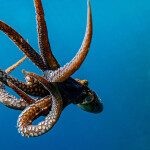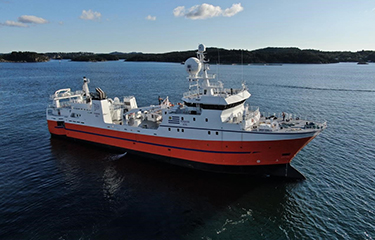Pesquera Azul, a Norwegian-owned longline fishing company operating out of Uruguay, has improved and streamlined ship operations in its new vessel, Ocean Azul, designed and built specifically to face the challenging conditions in Antarctic waters where it fishes Patagonian toothfish while also increasing catch volume and quality.
“Most longliners operating today are under-dimensioned for the Antarctic climate, and there are frequent incidents of hull damage due to ice,” Pesquera Azul CEO Arne Birkeland said in a company release. In response, Ocean Azul has been built to the highest ice class for commercial vessels, while also installing a redundant power supply to ensure safe return to port if the main power source fails, thereby ensuring higher safety levels.
Another main feature of the new vessel is the “Sago Pool,” an adjustable opening in the bottom of the ship that calms waves inside the pool, from where baited lines can be deployed and the catch can be landed in a protected space – a significant change from the traditional manner of casting and landing lines over the side of the vessel. Using model testing of the design, Pesquera Azul has shown that the Sago Pool reduces long-ship movement by 40 percent, which makes it easier to work in the aft section of the boat, also increasing crew safety.
One key challenge for longline toothfishing is that whales take as much as 70 percent of the catch in the water. As such, Pesquera Azul’s “Sago Extreme” concept, developed by Sago Solutions AS, encloses the catch using a cage that runs along the line, collecting and protecting live fish until they can be landed in the boat. Damage to the fish caused by gaffing when hauling laden lines is also eliminated.
“Toothfish stock is slow to build. If we can reduce the number of caught fish needed to fill quotas, we can help maintain the strength of the stock,” Birkeland noted.
Yet another major issue in the Patagonian toothfish industry is lost fishing lines, and to address this, Ocean Azul will use stronger lines to diminish breakage, thus reducing both lost catch and lost gear. The ship is also to be equipped with the “Ghost Gear Cleaner” toolkit for cleanup, collecting lost gear and returning it to shore. Up until now, fleets have had to avoid some of the most productive fishing grounds due to the so-called “ghost lines” formed by lost equipment.
“Sustainable fishing is a high priority for regional and local authorities, and our concept can help them achieve this goal. A big part of what we are doing is helping to bring a higher standard of operations to the region,” Birkeland said. “We can improve the catch and strengthen fish stock, while significantly improving working conditions and safety for crews. At the end of the day, these are the things that really matter for everyone in the fishing industry.”
Photo courtesy of Pesquera Azul







